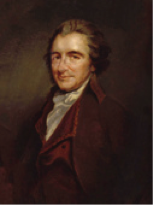 The story of Thomas Paine is, indeed, a curious one. He was one of the original Founding Fathers of the United States of America in the late 18th century. He was a great visionary, author of many books and pamphlets and a revolutionary thinker both in Europe and the new American States. He was feted everywhere he went as a man of the people but found himself out of favour in some quarters, in particular when he criticised the ruler Napoleon Bonaparte’s dictatorship in France. He was imprisoned in France for his trouble, but what followed is the really curious part. Having previously made such a great impression he received a personal invitation from President Jefferson to return to America in 1802. Yet, just seven years later, he died almost in ignominy with hardly anyone at his funeral. This formerly great man was now shunned by the very people that he helped to set free.
The story of Thomas Paine is, indeed, a curious one. He was one of the original Founding Fathers of the United States of America in the late 18th century. He was a great visionary, author of many books and pamphlets and a revolutionary thinker both in Europe and the new American States. He was feted everywhere he went as a man of the people but found himself out of favour in some quarters, in particular when he criticised the ruler Napoleon Bonaparte’s dictatorship in France. He was imprisoned in France for his trouble, but what followed is the really curious part. Having previously made such a great impression he received a personal invitation from President Jefferson to return to America in 1802. Yet, just seven years later, he died almost in ignominy with hardly anyone at his funeral. This formerly great man was now shunned by the very people that he helped to set free.
He was actually born Thomas Pain in February 1737, in the East Anglian town of Thetford. Some stories say that he changed his surname when he went to America but others say he did it before he left. His father was a Quaker involved in the stay making trade and some of Paine’s critics in later life joked that the boy had become apprenticed to a ladies’ corset maker. The truth though was that the “stays” were those used in sailing ship building. Thomas received a good education at Thetford Grammar School. Following school he filled a number of positions in the shipping industry in both Norfolk, Sussex and Cornwall and it was while in the town of Lewes, Sussex that he first became politically active.
It is said that the seeds of American independence were sowed in this small English town where Paine wrote pamphlets and spoke out against the monarchy along with other pro-republican individuals. It was inevitable that he would quit British shores to take up residence in the American colonies and he did so in 1774. Two years later he published the famous pamphlet Common Sense, which was a direct attack on King George III. Anti-British feelings were already strong in the colonies and this book fuelled the fire even more, portraying the old-style European hereditary monarchies as an absurdity. By now, though, Paine was relatively safe from any recriminations which was just as well as his powerfully written pamphlet urged independence from the British rulers.
Paine was a prolific writer of poetry and propagandist pieces in newspapers. One of his most stirring poems was The Boston Patriotic Song and the first verse of it is reproduced here. It’s a genuine call to arms to the “sons of Columbia”, extolling them to prevail in their battles against the colonials of all nations:

He was encouraged by revolutionary feelings being stirred in France and travelled back to Europe to throw his weight behind the cause. He published the Rights of Man in 1791, advocating freedom and justice for ordinary people anywhere in the world and he was so popular in France that he found himself elected to the French National Convention in 1792. Unfortunately his outspoken opinions against institutionalised religion saw him arrested and imprisoned between 1793 and 1794. The main cause of the antagonism against him was his book The Age of Reason (1794) which was a powerful argument promoting reason and freethinking. Another of his pamphlets which can be said, in retrospect, to have been somewhat ahead of its time was Agrarian Justice (1795). This covered the subjects of property ownership and guaranteed minimum income.
Soon afterwards Paine received his Presidential invitation to return to America and he did so in 1802. Sadly though he died shortly after and only six people turned up at his funeral, mainly because he had been just a little bit TOO outspoken when criticising and even ridiculing Christianity.
Thomas Paine died in New York City on the 8th June 1809. He was 72 years old.

